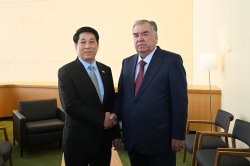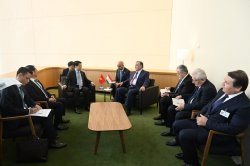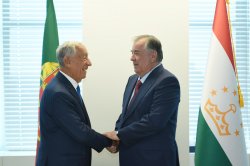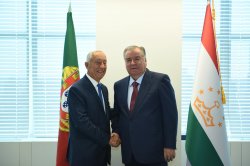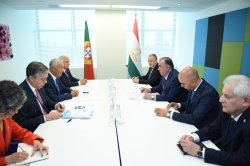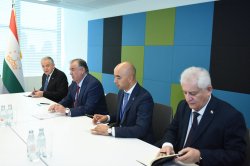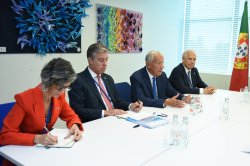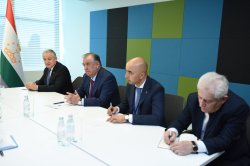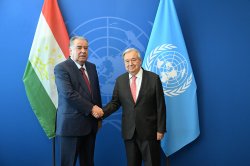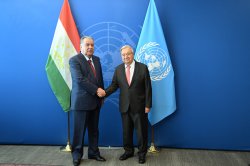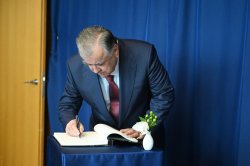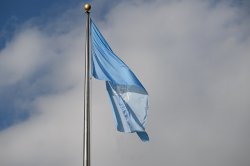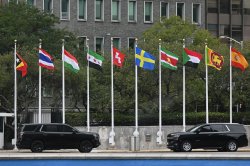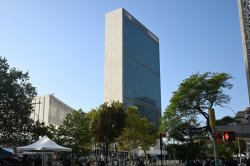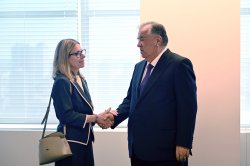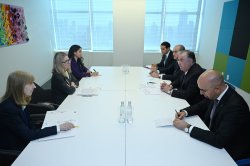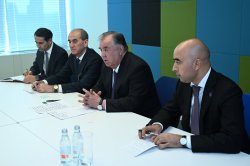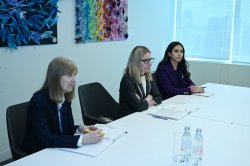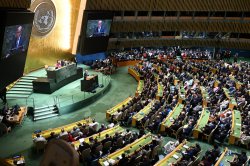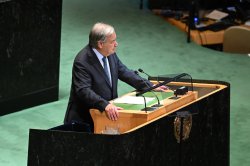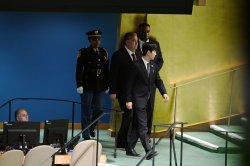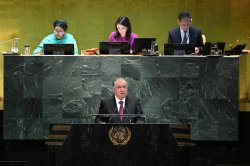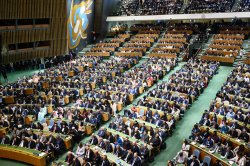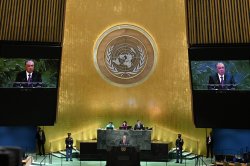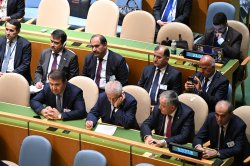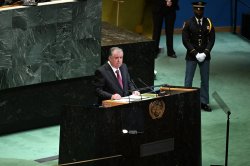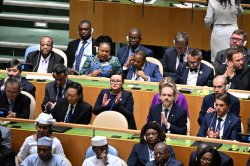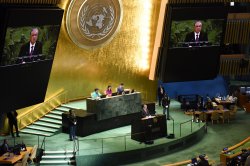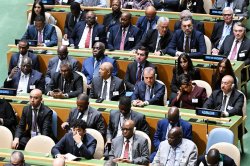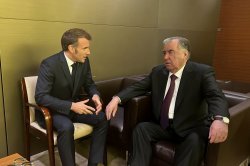On September 22, the President of the Republic of Tajikistan, Leader of the Nation, Honorable Emomali Rahmon, met with the President of the Socialist Republic of Vietnam, Honorable Luong Cuong in New York on the sidelines of the 80th session of the United Nations General Assembly.
Our Head of State Emomali Rahmon stated that Tajikistan and Vietnam, regardless of their geographical location, are bound by long-standing traditions of friendship and cooperation.
It was emphasized that the two countries have common interests and joint efforts to ensure peace and stability for the sake of development and progress, and uphold the values of peace, friendship, and cooperation.
For the active development of cooperation and political dialogue, it was proposed that the Ministries of Foreign Affairs of the two countries be tasked with taking effective measures.
In this context, strengthening interparliamentary and interagency cooperation was considered necessary.
The parties noted the existing opportunities for the enhancement of relations and proposed to increase efforts to effectively use them for the benefit of the peoples of the two countries.
Great attention was paid to increasing the volume of trade between the two countries, fostering cooperation in the industrial sectors, especially technological modernization of light industry and agriculture.
The improvement of cooperation in the sectors of education, healthcare, culture and tourism was also considered necessary.
The meeting also exchanged views on cooperation between the two countries within the framework of the United Nations, the Shanghai Cooperation Organization, and other regional and international organizations.
On September 22, the President of the Republic of Tajikistan, Leader of the Nation, Honorable Emomali Rahmon, met with the President of the Republic of Portugal, Honorable Marcelo Rebelo de Souza in New York on the sidelines of the 80th session of the United Nations General Assembly.
The meeting discussed issues related to strengthening and expanding friendship and cooperation between the two countries within the framework of bilateral and multilateral relations.
“We positively assess the process of developing cooperative relations between Tajikistan and Portugal within the framework of the European Union and are also eager to expand them in a bilateral format,” - said our Head of State Emomali Rahmon at the beginning of the conversation.
Great attention was paid to enhancing interstate political dialogue and contacts at various levels, strengthening the contractual and legal basis of relations, and expanding trade, economic, and investment cooperation.
It was highlighted that the use of Tajikistan's abundant natural and human resources, including "green energy" sources, rare minerals, and in combination with Portuguese advanced technologies and capital can serve the interests of both countries.
Cooperation in the humanitarian sectors, including education, healthcare, culture, tourism, and the exchange of teachers and students, was also considered to have broad potential.
A fruitful discussion was also held on strengthening cooperation within the framework of the United Nations, the European Union, the Organization for Security and Cooperation in Europe, and other international organizations, including on issues related to water and climate and supporting peace and stability in today's unpredictable world.
The meeting discussed the process of multifaceted and fruitful cooperation between Tajikistan and the United Nations.
As noted, the escalation of geopolitical disputes, security threats, armed conflicts, terrorism and extremism, economic and financial crises, and food insecurity require the continuation of effective and efficient cooperation.
A fruitful discussion was held on the implementation of the 2030 Agenda for Sustainable Development, the “United Nations 2.0” initiative, the Secretary-General’s Vision for the Modern United Nations System and its Comprehensive Reforms under the “United Nations 80” program, the Secretary-General’s initiative on the “Early Warning System for All” and Tajikistan’s global initiatives, including addressing water and climate issues, preserving glaciers, and combating terrorism and extremism.
It was noted with regret that only 35 percent of the Sustainable Development Goals will be implemented by 2030.
As emphasized by our Head of State, Emomali Rahmon, the effective use of digital technologies, including artificial intelligence, is essential for broad achievement of these goals.
Much attention was paid to preparations for the 2026 and 2028 United Nations Water Conferences, which will be held for the second time in Dushanbe.
It was also considered necessary to strengthen cooperation to eliminate threats and challenges related to terrorism and extremism, armed conflicts in various regions of the world, and to find political and diplomatic solutions to them.
On September 23, the President of the Republic of Tajikistan, Leader of the Nation, Honorable Emomali Rahmon, met with the Managing Director of the World Bank, Ms. Anna Bjerde, in New York City.
The meeting discussed the process of cooperation between Tajikistan and the World Bank.
The President of the country, Honorable Emomali Rahmon, called the World Bank one of the main development partners of Tajikistan and expressed gratitude to its leadership for fruitful cooperation.
Particular attention was paid to the development of cooperation in the hydropower sector and financing projects in this area.
A fruitful exchange of views took place on ensuring the sustainable development of various sectors of the national economy of Tajikistan, such as industry, agriculture, infrastructure and communications, digitalization, education, the private sector and the creation of new jobs, as well as improving the social situation of the population.
The effective implementation of the Development Support Policy Project and the drafting of a new Strategy for cooperation between Tajikistan and the World Bank for the next five years were other topics of discussion.
The interlocutors deliberated on the consequences of climate change and the complex situation in the region and the world, which negatively affects the implementation of development plans and prospects.
A useful exchange also took place on other issues of mutual interest.
On September 23, the President of the Republic of Tajikistan, Leader of the Nation, Honorable Emomali Rahmon, participated in and delivered a speech at the General Debate of the 80th session of the United Nations General Assembly in New York.
At the beginning of his address, the President of our country, Emomali Rahmon, sincerely congratulated the heads of state on the 80th anniversary of the adoption of the UN Charter.
Emomali Rahmon also shared his thoughts on the modern world facing instability, uncertainty, and increasing complexity, as well as the consequences of climate change, emphasizing the important role of the UN as a platform for dialogue, cooperation, and the strengthening of global peace and security. He called on countries to make joint and consistent efforts to preserve this truth and return to full compliance with international law.
In this context, it was also noted that strengthening equitable cooperation between small and large states is also considered an important and timely step.
Noting the difficult situation of developing countries, particularly mountainous and landlocked ones, the President highlighted the need to take serious measures to ensure financing for sustainable development and improve access to financial resources.
It was emphasized that Tajikistan supports effective and equitable reforms of international financial mechanisms.
It was pointed out that many developing and least developed vulnerable countries continue to suffer from the consequences of economic and financial crises, poverty, infectious diseases, including COVID-19, natural disasters, and food insecurity.
The Head of State called for special attention to the adoption of effective measures to provide financial support to this group of countries.
Particular attention was paid to the challenges posed by climate change, which create serious obstacles to achieving the Sustainable Development Goals in various countries, including Tajikistan.
It was noted that the effects of climate change and rising temperatures have led to the rapid melting of glaciers and the deterioration of marine and ocean ecosystems.
“We must not remain indifferent to the process of addressing the problems associated with the source of human life — water," - emphasized the Leader of our state, Emomali Rahmon.
The Head of State drew the attention of the high-level participants to Tajikistan's latest initiative in the water sector and the practical measures developed by Tajikistan within the framework of the International Decade for Action, "Water for Sustainable Development, 2018-2028," and called on Member States and stakeholders to actively participate in the next event of the "Dushanbe Water Process" — the High-Level International Conference, to be held in Dushanbe in 2026.
It was stressed that the global community is currently witnessing the disregard and violation of international law, which is the foundation of order, peace, and stability in the world.
"We emphasize the importance of strict adherence to international laws and the resolution of all conflicts and disputes within the framework of the law," - stated President Emomali Rahmon.
Deeply aware of this reality, the Head of State proposed that the UN General Assembly consider declaring an International Year of Legal Education.
He called on all Member States to join this initiative and strengthen a global culture of transparency and justice.
During his speech, Emomali Rahmon also drew attention to the accelerated adoption of digital technologies and the appropriate use of artificial intelligence to achieve the Sustainable Development Goals, as well as new security threats, particularly cybercrime, emphasizing that cybersecurity must be an important component of collective security.
It was noted that the relevant UN bodies, particularly the Office of Counter-Terrorism, can effectively contribute to the comprehensive implementation of global counter-terrorism strategies and programs and strengthen support to Member States in this area.
Honorable Emomali Rahmon stated that Tajikistan supports the resolution of all disputes and conflicts through political and diplomatic means.
In this regard, the Leader of the Nation reiterated his new initiative to adopt a special UN resolution declaring the "Decade for Strengthening Peace for Future Generations".
It was highlighted that, given the contradictory situation in today's world, this initiative will create a foundation for international cooperation to achieve lasting peace.
The President of our country urged all Member States to support this proposal, both for the sake of stability today and a better life for future generations.
His Excellency Emomali Rahmon also noted that a solution to the Palestinian issue and lasting peace in the Middle East is only possible through the implementation of UN resolutions and the "Two-State Solution."
In this regard, the Head of State called for a sustainable ceasefire in the Gaza Strip and access to humanitarian aid.
It was noted that Tajikistan also supports peace and stability, complete security, and socio-economic development in Afghanistan.
"Tajikistan supports comprehensive UN reform in the context of the UN 80, UN 2.0, and the Secretary-General's Vision for a Modern UN System," – pointed out His Excellency Emomali Rahmon.
Furthermore, the "Pact for the Future" was noted as an important collective initiative aimed at promoting peace and sustainable development.
Concluding his speech, the President of the Republic of Tajikistan, Leader of the Nation, Honorable Emomali Rahmon, emphasized that our country is ready to cooperate with partner countries and all UN Member States in achieving these goals and addressing other pressing issues on the global agenda.
The meeting discussed issues related to the expansion of bilateral relations and cooperation within international organizations to promote joint initiatives of the two countries, including on water and climate issues.
A fruitful exchange of views was also held on other issues of mutual interest.
